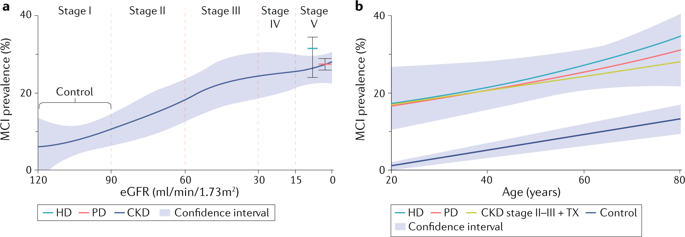Nature Reviews Nephrology ( IF 41.5 ) Pub Date : 2020-03-31 , DOI: 10.1038/s41581-020-0266-9 Davide Viggiano 1, 2 , Carsten A Wagner 3 , Gianvito Martino 4 , Maiken Nedergaard 5 , Carmine Zoccali 6 , Robert Unwin 7, 8 , Giovambattista Capasso 1, 2

|
Cognitive impairment is an increasingly recognized major cause of chronic disability and is commonly found in patients with chronic kidney disease (CKD). Knowledge of the relationship between kidney dysfunction and impaired cognition may improve our understanding of other forms of cognitive dysfunction. Patients with CKD are at an increased risk (compared with the general population) of both dementia and its prodrome, mild cognitive impairment (MCI), which are characterized by deficits in executive functions, memory and attention. Brain imaging in patients with CKD has revealed damage to white matter in the prefrontal cortex and, in animal models, in the subcortical monoaminergic and cholinergic systems, accompanied by widespread macrovascular and microvascular damage. Unfortunately, current interventions that target cardiovascular risk factors (such as anti-hypertensive drugs, anti-platelet agents and statins) seem to have little or no effect on CKD-associated MCI, suggesting that the accumulation of uraemic neurotoxins may be more important than disturbed haemodynamic factors or lipid metabolism in MCI pathogenesis. Experimental models show that the brain monoaminergic system is susceptible to uraemic neurotoxins and that this system is responsible for the altered sleep pattern commonly observed in patients with CKD. Neural progenitor cells and the glymphatic system, which are important in Alzheimer disease pathogenesis, may also be involved in CKD-associated MCI. More detailed study of CKD-associated MCI is needed to fully understand its clinical relevance, underlying pathophysiology, possible means of early diagnosis and prevention, and whether there may be novel approaches and potential therapies with wider application to this and other forms of cognitive decline.
中文翻译:

CKD认知功能障碍的机制。
认知障碍是越来越公认的慢性残疾的主要原因,常见于慢性肾病 (CKD) 患者。了解肾功能不全与认知障碍之间的关系可能会提高我们对其他形式的认知功能障碍的理解。CKD 患者患痴呆症及其前驱症状轻度认知障碍 (MCI) 的风险增加(与一般人群相比),其特征是执行功能、记忆力和注意力缺陷。CKD 患者的脑成像显示前额叶皮层和动物模型中皮层下单胺能和胆碱能系统的白质受损,并伴有广泛的大血管和微血管损伤。很遗憾,目前针对心血管危险因素的干预措施(如抗高血压药物、抗血小板药物和他汀类药物)似乎对 CKD 相关的 MCI 影响很小或没有影响,这表明尿毒症神经毒素的积累可能比血流动力学因素紊乱更重要或 MCI 发病机制中的脂质代谢。实验模型表明,大脑单胺能系统对尿毒症神经毒素敏感,并且该系统是导致 CKD 患者常见的睡眠模式改变的原因。在阿尔茨海默病发病机制中很重要的神经祖细胞和淋巴系统也可能参与 CKD 相关的 MCI。需要对 CKD 相关的 MCI 进行更详细的研究,以充分了解其临床相关性、潜在的病理生理学、



























 京公网安备 11010802027423号
京公网安备 11010802027423号